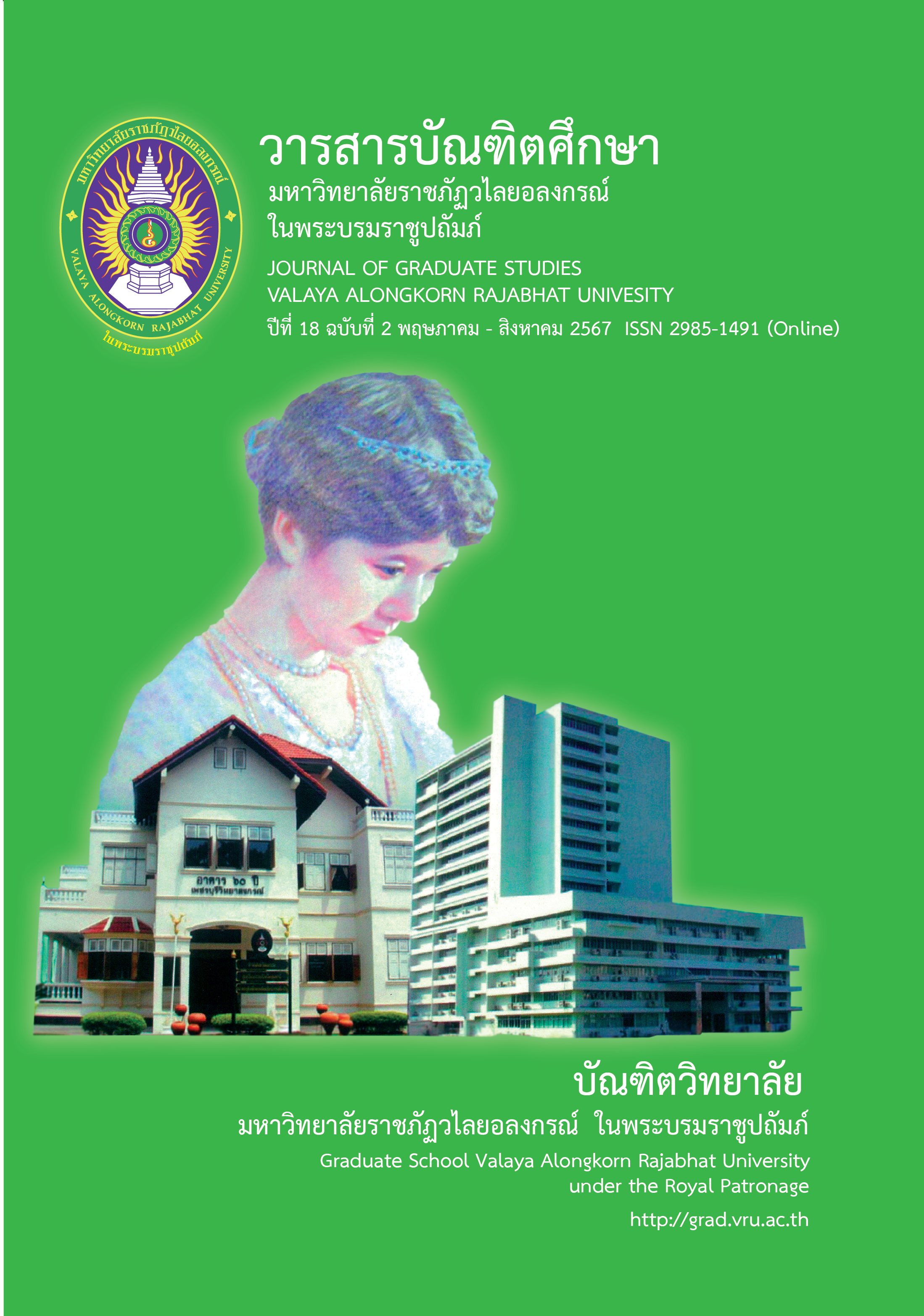THE EFFECTS OF BOARD GAMES ACTIVITIES ON KHID–KHAD-YAEK WITH GPAS 5 STEP TO PROMOTE THINKING SKILLS
Main Article Content
Abstract
The purposes of this research were to 1) design and development Board games on khid-khad-yaek, 2) study the students’ thinking skills after learning using Board games on khid-khad-yaek with the Gpas 5 step compared with the criteria of 75 percent, and 3) study the students’ satisfaction towards learning activity using Board games on khid-khad-yaek with the Gpas 5 step. The subjects were students at Watkhunyingsomjean school, Pathum Thani Primary Educational Service Area Office 1, course in the first semester of the academic year 2022 with cluster sampling, there were 30 students in total. The research tools included 1) board games on khid-khad-yaek, 2) GPAS 5 step learning plan, 3) a thinking skills assessment form and 4) satisfaction form. The statistics used included mean, standard deviation, and t-tests.
The results indicated as follows: 1) Characteristics of the game developed as a game with content about waste sorting, throwing garbage into the bins according to the type of each color bin consists of red, yellow, green and blue bins. Game components Includes game board, dice, game piece and token. Overall quality assessment results at the highest level ( = 4.60, SD= 0.54). 2) Students’ thinking skills after learning an average score of 81.28 %, which was higher than the specified criterion of 75 % at a significant level (p<.05). And 3) the satisfaction level of the students was very high (
= 4.53, SD = 0.50).
Article Details

This work is licensed under a Creative Commons Attribution-NonCommercial-NoDerivatives 4.0 International License.
บทความทุกเรื่องได้รับการตรวจความถูกต้องทางวิชาการโดยผู้ทรงคุณวุฒิ ทรรศนะและข้อคิดเห็นในบทความ Journal of Global of Perspectives in Humanities and Social Sciences (J-GPHSS) มิใช่เป็นทรรศนะและความคิดของผู้จัดทำจึงมิใช่ความรับผิดชอบของบัณฑิตวิทยาลัย มหาวิทยาลัยราชภัฏวไลยอลงกรณ์ ในพระบรมราชูปถัมภ์ กองบรรณาธิการไม่สงวนสิทธิ์การคัดลอก แต่ให้อ้างอิงแหล่งที่มา
References
Bloom, B. S. (1971). Handbook on formative and summative evaluation of student learning. New York: McGraw-Hill.
Chaloemkit, T. (2002). kēm phāsā ʻangkrit samrap dek [Games for children]. Bangkok: Windows on The World.
Chansook, R. & Chookhampaeng, S. (2022). kānphatthanā kitkam kānrīanrū chīwawitthayā dūai kānčhatkān rīanrū bǣp sư̄̄psǫ hākhwām rū hā khan (hā E) rǭwǭ bǭkānchai bǭt kēm phư̄a songsoēm kān Kid choēng rabop khǭng nak rīan namat yom Sưksā pī thī sī [A development of biology learning activities by using the inquiry method 5E]. Journal of Sarakham Rajabhat University. 16(3), 64-74.
Chantree, S. & Sripan, A. (2022). kānphatthanā bǭt kēm ʻong panhā mǭlǭphit čhāk khēmā khwan ʻǭ ʻaya phư̄a soēmsāng khunlaksana phonlamư̄ang tư̄̄n rū phān kānčhatkān Sưksā bon thān chumchon samrap nakrīan nai phư̄̄nthī ʻamphoēmư̄ang čhangwat kamphǣngphet [The development of boardgame on pollution problems from sugarcane smog to promote active citizen characteristics through community-based educational management for students, Mueng district, Khamphaeng Phet province]. Jurnal of graduate research. 13(1), 61-67.
Eiamwilai, W. & Sirawong, N. (2021). kānphatthanā bǭt kēm tām nǣothāng kān Kid yāng mī wičhānyān phư̄a songsoēm khwāmpen Pol mư̄a ngǭdi čhi than khǭng nak rīan namat yom Sưksā pī thī nưng [The development of board game based on critical thinking to enhanced digital citizenship of seventh grade students]. Journal of Educational Research. 16(1), 70-85.
Jaithiang, A. (2010). lakkān sǭn [General methods of teaching]. Bangkok: Odeonstore.
Khammani, T. (2012). sāt kānsō̜n: ʻongkhwāmrū phư̄a kānčhat krabūankān rīanrū thī mī prasitthiphāp [Pedagogy: Knowledge to the effective learning process]. The 1st. Bangkok: Chulalongkorn University.
Ministry of Education. (2009). laksūt kǣn klāng kānsưksā naphư̄̄n thān phutthasakrāt sǭngphanhārǭihāsipʻet [Basic education core curriculum, 2008]. Bangkok: Agricultural cooperative printing demonstrations of Thai Co., Ltd.
Nakasan, N. & Nakasan, C. (2016). kēm: nawatkam phư̄a kānsưksā choēng sāngsan [Game: Innovation for creative education]. Rompruek Journal Krirk University. 34(3), 159-182.
Preedaporn, A. (2014). kānʻǭkbǣp bǭt kēm kānsưksā ʻong wong sī Thammachat samrap nak rīan chan prathom Sưksā pī thī hok [Design a boardgame to study colour circle for students in grade 6]. Doctoral dissertation. Srinakharinwirot University.
Sittiwong, T. (2021). kānsưksā phon khǭng kānchai bǭt kēm phư̄a songsoēm kānrīanrū samrap Nisit radap Parinya trī khanasưksāsāt Mahāwitthayālai narēsūan [The effects of using board game to promote learning for undergraduate students’ faculty of education Naresuan university]. Journal of Education Naresuan University. 23(4), 187-199.
Siljaru, T. (2020). kānwičhai læ wikhrǫ khǭmūn thāng sathit dūai SPSS læ AMOS [Research and statistical analysis with SPSS and AMOS]. Bangkok: S. R. Printing massproducts company limited.
Siegler, R. S. & Ramani, G. B. (2009). Playing linear number board games but not circular ones improve low-income preschoolers’ numerical understanding. Journal of Educational Psychology. 101(3), 545-560.
Srihawong, P. (2019). kānphatthanā khwāmsāmāt nai kān Kid wikhrǫ khǭng nak rīan namat yom Sưksā pī thī sǭng dōi kānčhatkān rīanrū dūai krabūankān GPAS [The development of critical thinking abilities of eighth grade students taught the GPAS]. Doctoral dissertation. Silpakorn University.
Songsai, N. & Sitiwong. T. (2020). kānsưksā phon kānchai bǭt kēm prakǭp kān rīan kānsǭn rāiwichā witthayāsāt ʻong rabop Niwet phư̄a songsoēm khwāmsāmāt nai kān Kid wikhrǫ samrap nakrīan namat yom Sưksā pī thī sām rōngrīan sī samrōng chanūpa tham [The study of the result in using board games as the teaching materials in science subject; “ecosystem” for encouraging the critical thinking skills of 3th grade students in risamrongchanupatham school]. E-Journal of Media Innovation and Creative Education. 3(2), 1-10.
Thavornsukanan, O. (2016). phon kānčhatkān rīanrū dōi chai krabūankān čhī phǣ sǭ thī mī tǭ khwāmsāmāt nai kān khīan rīangkhwām læ čhēt khati tǭ ʻakān khīan khǭng nak rīan namat yom Sưksā pī thī sī [Effects of learning management using the G-Pass process on essay writing abilities and writing attitudes of mathayomsuksa 4 students]. Doctoral dissertation. Srinakharinwirot University.
Tiantong, M. (2002). kānʻǭkbǣp læ phatthanā khǭtwǣ [Courseware design and development for CAI]. Bangkok: King Mongkut's Institute of Technology North Bangkok Textbook Production Center.
Wadeesirisak, P. (2020). kānphatthanā khwāmpen phonlamư̄ang saičhai læ phon Sumrit thāngkān rīan Wicha witthayāsāt khǭng nak rīan chan prathom Sưksā pī thī hā dōi chai krabūankān rīanrū hā khan tǭn [The development of active citizenship and science learning achievement for grade 5 students through GPAS 5 steps process]. Doctoral dissertation. Srinakharinwirot University.
WanichwattanaWorachai, S. (2016). withī sǭn thūapai [Method of teaching]. Nakhon Pathom: Silpakorn University.


